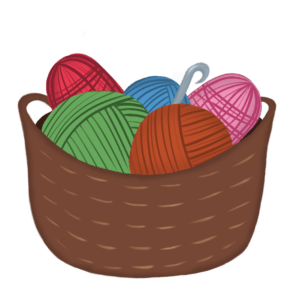By Prapti Bamaniya
Visuals by Kinza Zafar
Spools of pink and red yarn looped around each other with precision in Danielle Reid’s steady hands as she sat in her bedroom on a hot summer day in 2020. The now third-year journalism student was putting her hobby to use—one she perfected when her classes went virtual and the threat of a new infectious disease called COVID-19 first plagued the world. Her grandmother helped guide Reid’s first few steps into the art of crochet when she was around the age of 10 but it never really stuck because she had no time to enjoy and savour the craft. Now, amidst a global pandemic, she had all the time in the world.
Her TV played in the background as she finished up the neatly-crocheted pink and red speckled tank top in her cozy room when she decided this piece was something she wanted to post to her Instagram. Within days, her post garnered so much love from her friends and family that it inspired her to start her own crochet business.
That tank top was just the tip of the iceberg. Reid officially opened her store, named Ides of May, which is a reference to a phrase used in William Shakespeare’s play Julius Caesar, in August of 2020. Reid has an interest in history and understood the phrase to mean new beginnings and a fresh start. With her birthday landing in May, she personalized the line and decided to make it the name of her shop, which is also a nod to her creative nature in itself.
Reid started crocheting bags, purses, hats and even began making jewelry for her shop. To keep up with the demand for her products, the background TV noise she once worked to slowly turned into the voices of her professors talking on her laptop, as she often found herself crocheting during virtual classes. Before she knew it, her relationship with crocheting had changed. She didn’t find herself going for her five-millimetre metal needle when she needed to de-stress anymore. Now, it was work.
“It started getting a little stressful because your hobbies are what you used to do when you were wanting to relax,” Reid says. “But now, it’s for somebody else.”
Most people grow up aspiring to love what they do and dream of building a career out of their passion. But for some, when a passion turns into a business, their relationship with what may have once been a happy pastime can quickly turn sour.
For some students at Toronto Metropolitan University (TMU) who have built a business from their passion, it can become all-consuming and seemingly never-ending.
Diana Goodwin, the founder of AquaMobile, an at-home swimming lesson company, and MarketBox, a scheduling software company, says while a business can stem from a hobby, there are a few initial aspects to handle that one might not have a passion for.
“In the early days, there are things like the bank accounts, incorporation, all of that stuff. But then there’s getting your first customers and adapting and modifying your product or service as you get more feedback on it.”
Goodwin started AquaMobile because of her passion for swimming and helping people feel safe in the water. Gradually though, she too found herself having less time to physically teach swimming lessons after her business started.
“For me, it was a natural transition where I enjoyed that business side of things,” says Goodwin. “But I’ve definitely met a lot of people who don’t enjoy that transition, so it’s not necessarily for everyone.”
Janet Lewis, an entrepreneur and the founder of the e-commerce company Orange Fish, recognizes this, which is why she created her company to help creatives focus on their projects.
“It’s important for people to know that even if they’re going to turn their business into a passion, there’s so much more that goes along with that,” she says. “I think it’s great if people are able to take on those pieces but some of those pieces are also very challenging.”

These more business-heavy aspects are challenges that come with the territory of opening one’s own store or company. But what happens when a new business owner is unprepared for these new responsibilities?
As the popular saying goes, “don’t eat where you shit.” A 2017 Journal of Business and Psychology study found that some workers who blur the lines between work and free time were less likely to participate in activities that could help them relax. This means it is more likely for people to be more stressed with little time to relax when they have no set structure to differentiate between work and play.
Adding a layer of stress and pressure to monetize a hobby can have negative effects on the relationship that some TMU business owners have with their hobbies. This can push them to eventually rely on other things to relieve stress, like reading and watching TV shows, rather than spending time on their original hobby.
However, despite the demands of starting a business, Goodwin says the job is less likely to feel like hard work when there’s passion behind it.
“I kind of tie it all back to that passion. You really have to be passionate about what you’re doing, so that it doesn’t feel like hard work.”
TMU students don’t regret starting their own businesses from their hobbies. To them, although it can be stressful, “shitting where you eat” can be worth its costs.

Chopper, a twelve-year-old golden retriever, watched Holly Smith weave an intricate pattern with coloured yarn as an episode of Grey’s Anatomy played in the background. It was July 2021 and Smith was house-sitting and watching Chopper, a neighbour’s dog, for the week.
The second-year media production student was asked to house-sit while Chopper’s owners were gone through the summer. By the end of her tenure in their home, there would usually be a Smith-sized dent in the couch because of the hours she’d spend sitting in one spot working on her crochet project. Chopper on the other hand, often thought the yarn was a chew toy and would usually disrupt Smith’s project with a chomp of his own.
Since Smith had ample free time during these house-sitting visits, she took this as an opportunity to build a social media following among the crochet community on YouTube and TikTok. She would set up her phone whenever she was crocheting—whether it was in her room, on the subway or while watching Chopper—and film a time-lapse of her creating her latest project. Some designs would be her own passion projects, like animal hats, and others, like sweaters, would be orders she would get from her Instagram shop, Lovely Mushroom Crochet.
When she first opened her shop in May 2021, Smith started off making items she personally loved, like her signature frog and strawberry hats. She then gradually shifted to adding other trendier items that were more popular with her customers, like single-colour bags. With the help of her mom, who owns a handmade pillow shop on Etsy herself, she eventually began creating inventories that would sell out within a day at an in-person market in her hometown of Hudson, Ohio.

And while her new-found success was exciting, Smith had less of an opportunity to test out new crochet designs and little time to simply crochet for herself anymore.
“It did change my relationship with crochet because it felt a little bit more like a chore sometimes when I was making things that I didn’t necessarily want to be making,” she explains.
Smith started to crochet countless plushies, little toys made of yarn that resembled various animals and single-coloured bags—items that she spent a whole summer creating, that she didn’t particularly like to make—but would be very popular with her consumer market.
“Making those things was a little bit stressful [because I was] making lots of the same thing in different colours,” she says. Smith liked to just make things she wanted to crochet and then see those sell more instead.
According to a 2015 article from the Journal of the Human Factors and Ergonomics Society, researchers found that boredom in the workplace was common when workers were subjected to completing monotonous and repetitive motor tasks. This was especially true for jobs that required constant attention as workers would have to work even harder to remain both physically and mentally focused on the task at hand.
In Smith’s case, crocheting over 50 plushies and bags throughout her summer break quickly became monotonous. “It was a little bit stressful because my mom said I needed to pick certain colours and make everything in those colours for them to sell,” says Smith.
Goodwin says while using a hobby to act as the backbone of a business can be beneficial, it certainly isn’t for everyone and it can be worth changing paths to save your relationship with your once-favoured pastime.
“It is okay to change your mind and realize that you don’t have to tie your entrepreneurial endeavour to your hobby,” she says. “There’s nothing wrong with that.”

She also says having other interests and hobbies is good practice. In doing so, one will hopefully always have another way to de-stress that isn’t work-related at all.
Lewis agrees with this sentiment but she also believes that passion can help keep entrepreneurs interested in their jobs for longer.
“A lot of people are shifting from success being making millions and millions of dollars to success being, obviously making enough money to pay for their daily living expenses but also being happy at the end of the day,” Lewis says.
For Smith, while crocheting the same thing can be tedious, she finds joy in editing and producing her TikToks and YouTube videos. It’s a way for her to relax and despite content creation being somewhat tied to her business, it ultimately motivates her to finish her crochet projects too.
“I like making the videos and I like crocheting. So I think I see it more of a reward for doing something I’m already doing,” she says.
“By focusing on social media, I get to make things that I want to make but still show them to lots of people.”

Back in 2020, Reid’s grandmother looked over her shoulder as she was crocheting one of her first orders: a carefully-woven green bucket hat. The two sat on blankets on a beach in Barrie, Ont. in front of the water in what was an almost empty area during the middle of the pandemic.
As the pair relaxed together, Reid thought back to happy childhood memories of her grandmother first teaching her how to crochet. She fondly remembered how she would go to school in fifth grade with a needle and yarn in her backpack to make the chain her grandmother taught her to create. She recalls looking up to her grandmother and her expertise in the fibre arts and how her grandmother never really had to actively think about patterns—which would come naturally to her.
“I wanted to have a part in [crocheting with her]…I think that she liked the idea [of the business later] and she helped me with that but I think she was very supportive of this business.”
Since that summer, Reid’s grandmother moved to Jamaica but crochet is something she’ll always share with her. No matter how stressful her business gets, it will always be a way to stay connected with her.
Reid still calls her grandmother for advice when she gets stuck on projects or needs help. Once, after sending a photo of a hat she made for her dog, Reid’s grandmother messaged her a response. “You are so talented Danielle,” she wrote.
“It’s a really nice blessing to be able to do something that you really enjoy doing and also build a community around it,” says Reid. “It’s definitely something that I want to continue with and I don’t want to get rid of it.”










Leave a Reply